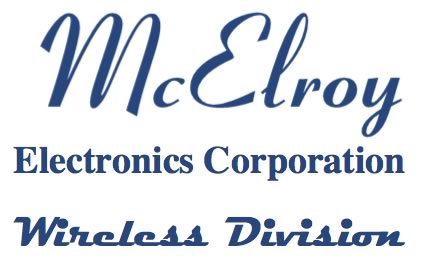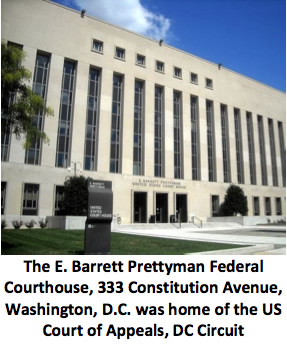
Cellular Telephone License Litigation
McElroy Electronics Corporation
vs.
Federal Communications Commission
| McElroy I: | US Court of Appeals 1993 |
| McElroy II: | US Court of Appeals 1996 US Supreme Court 1996 (Appeal made by the Federal Communication Commission) |
McElroy’s Two Triumphs at the US Court of Appeals
 McElroy’s wireless entrepreneurial activities resulted in 7 years of prolonged litigation with the Federal Communications Commission (FCC).
McElroy’s wireless entrepreneurial activities resulted in 7 years of prolonged litigation with the Federal Communications Commission (FCC).
The cases are known in the industry as McElroy I and McElroy II.
In the summer of 1988, after more than 8 months of research and engineering preparation and some $12 million of financial commitments, McElroy submitted through its Washington, DC, law firm the first of four applications to the FCC.
McElroy’s applications, presented on Public Notice, requested four 800mhz bandwidth licenses to provide cellular telephone service to certain areas across the country that had been disregarded and ignored by two “Baby Bell” telephone companies, Nynex and Pacific Telesis; and two independent wireless companies, McCaw Communications (acquired by AT&T Wireless Services) and Metro Mobile CTS (acquired by Bell Atlantic).
The application was met with foreboding concern from the haughty “Baby Bells” and the law firms representing them. But our application was regarded by the other two players and their attorneys as a most innovative pioneering endeavor.
The cellular telephone industry was still in its infancy, and we were on our way to regain our company’s position in the cellular telephone business. Three years earlier, McElroy Electronics owned controlling interest in Dutchess County Cellular Telephone Company in Poughkeepsie, NY.
At issue were some of the most lucrative markets in the world at that time––Los Angeles, Minneapolis, Boston, and Phoenix were undoubtedly the cream of the crop.
Since the “McElroy application” was unprecedented, it presented a challenge to the FCC for processing and granting cellular telephone licenses for “unserved areas,” pockets of areas not covered by the current licensee at the end of a five year period allotted by the rules to cover its entire service area.
The Commission eventually dismissed the McElroy applications as “premature.”
We appealed our dismissal; first to the FCC staff, then to the Mobile Services Division (now called the Wireless Telecommunications Bureau), then to the full Commission, and finally to the US Court of Appeals in Washington, DC, the second highest court in the country. The US Court of Appeals hears cases on appeal that are filed against any federal agency.
An appellant must show that the agency’s action was so egregious and that the agency’s decision was arbitrary, capricious, and abused its discretionary authority. As a matter of fact, the courts usually give federal agencies very broad discretion on interpreting their rules, that is, due deference. When it comes to suing the federal government, “a tie” does NOT go to the runner. The higher court usually sides with the lower court (the federal agency) against the appellant.
McElroy I was tried before a three-judge panel: Abner J. Mikva, Chief Judge; Patricia M. Wald and James L. Buckley, Circuit Judges.
Argued March 4, 1993.
Decided April 23, 1993.
After years of litigation with the Bell Telephone companies and the FCC, the McElroy case was finally heard by the US Court of Appeals.
We were there for the oral arguments before the three-judge panel. The decision, or “opinion,” of the Court was rendered on April 23, 1993. The FCC order that dismissed our applications was reversed and our applications were remanded to the FCC and ordered to be reinstated nunc pro tunc, which means “now as then.”
We won the case. Or did we?
The Remand Order from the Court of Appeals to reinstate the McElroy applications nunc pro tunc languished at the FCC for over 3 years. That’s when we learned…
Justice Delayed Is Justice Denied
The FCC delayed acting on the Court’s order, then tried to muddy the waters.
The administration of the FCC, made up mostly of attorneys, decided to allow other concerns to submit applications that would be mutually exclusive with McElroy’s. As you can imagine, agency lawyers don’t like to lose. They also have a vast amount of tools to obstruct an unfavorable decision––and did so in this instance.
In October, McElroy filed a writ of mandamus with the Court, directing the Commission to act. The Court set a December 1994 date to hear the merits.
So this is what it feels like to be a “pioneer.” You get to fight the U.S. government, who uses your money (and everyone else’s) to continue to fight you. Plus, we were confronted with going to court again but needed a memorandum opinion and order from the very agency that we were fighting.
McElroy II was tried before a three-judge panel: James L. Buckley, Stephen F. Williams, and Judith Ann Wilson Rogers, Circuit Judges
Argued May 16, 1996.
Decided June 21, 1996.
Rehearing Denied August 19, 1996
In the end, McElroy defeated the FCC––twice. Since agencies of the federal government do not like to be embarrassed by losing cases and having their decisions overturned, it didn’t end there.
The US Supreme Court Appeal
 Even after having their decision reversed by the US Court of Appeals, the FCC appealed to the US Supreme Court to have the US Court of Appeals decision reversed.
Even after having their decision reversed by the US Court of Appeals, the FCC appealed to the US Supreme Court to have the US Court of Appeals decision reversed.
This is called a Petition for Writ of Certiorari (informally called “Cert Petition”). It is a document filed by a losing party with the Supreme Court asking the Supreme Court to review the decision of a lower court, which in our case was the US Court of Appeals. Certiorari is a Latin word meaning “to be informed of, or to be made certain in regard to.”
It includes a list of the parties, a statement of the facts of the case, the legal questions presented for review, and arguments as to why the Court should grant the writ.
The petition by the FCC to the US Supreme Court was denied.
Case Summaries:
McElroy Electronics Corporation
vs.
Federal Communications Commission
McElroy I Decision: April 23, 1993––In favor of McElroy
“Applications for cellular license by non-incumbents seeking to serve areas within standard metropolitan statistical areas (MSA) not being served by incumbent licensees were dismissed as premature by the Federal Communications Commission (FCC). Applicants petitioned for review. The Court of Appeals, Wald, Circuit Judge, held that FCC order and report failed to put applicants on notice that they could not apply for unserved areas after expiration of five-year protected period until FCC had made additional announcement of relevant dates. Reversed and remanded with instructions.”
The Court further stated…
“Accordingly, we reverse the Commission’s order dismissing petitioners’ applications as premature and remand with instructions to reinstate L.A. Partnership’s, McElroy’s and JAJ’s applications nunc pro tunc, and to do the same with Price’s if it determines that it was timely filed.”
The Court ruled that McElroy “MAY” file an application any time after the 5-year expiration date. Later filers “MUST” file by a certain date. The decision came down to the difference in meaning of these two words.
As noted by the Court, “See WEBSTER’S THIRD NEW INTERNATIONAL DICTIONARY 1396 (1981) (defining ‘may’ as to ‘have permission to’ or to ‘have liberty to’); id. at 1492 (defining ‘must’ as ‘obliged to’ or ‘required by law’).”
McElroy Electronics Corporation
vs.
Federal Communications Commission
McElroy II Decision: June 21, 1996––In favor of McElroy
“The court ordered the Federal Communications Commission (“Commission”) to reinstate nunc pro tunc appellants’ applications for … licenses to provide cellular telephone service in Los Angeles and Minneapolis. Two years later, the Commission decided that the reinstated applicants would have to enter a lottery with as many as 500 other applicants for the same licenses. Because the record demonstrates that other applicants had fair notice of a sixty-day deadline for filing competing applications, yet did not apply until more than four years after appellants did, we conclude that the Commission erred and we again remand the case to the Commission.”
Click on these links to learn more about the cases:
McElroy Electronics Corp. v. FCC, 301 U.S.App.D.C. 81, 990 F.2d 1351 (1993)
McElroy Electronics Corp. v. FCC, 318 U.S.App.D.C. 174, 86 F.3d 248 (1996)
